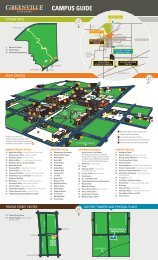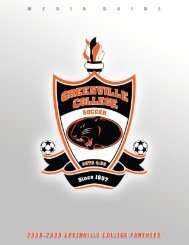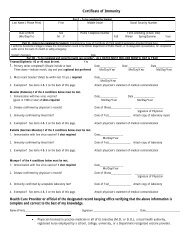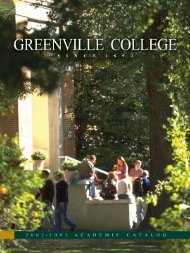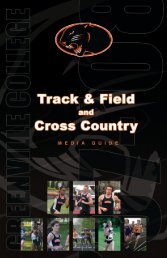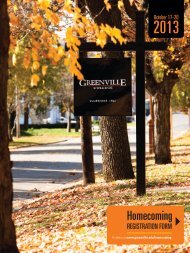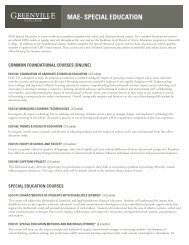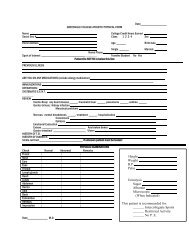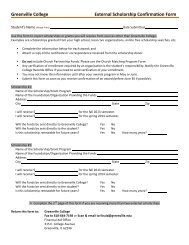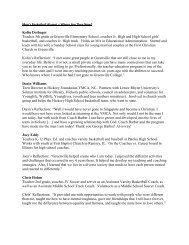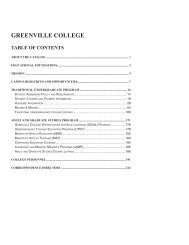2012-2014 UndergraduateCatalog.pdf - Greenville College
2012-2014 UndergraduateCatalog.pdf - Greenville College
2012-2014 UndergraduateCatalog.pdf - Greenville College
You also want an ePaper? Increase the reach of your titles
YUMPU automatically turns print PDFs into web optimized ePapers that Google loves.
GENERAL EDUCATION<br />
Philosophy<br />
All students except those entering with an A.A., A.S., or A.A.T. degree must complete the<br />
philosophy requirement. They may do so by taking any three-credit course in philosophy.<br />
All philosophy courses are designated by the prefix PHL. Typically, students will take PHL<br />
201 Major Issues in Philosophy.<br />
Psychology<br />
All students except those entering with an A.A., A.S., or A.A.T. degree must complete the<br />
psychology requirement. They may do so by taking any three credit psychology course<br />
except PSY 202 Statistics. Often students take either PSY 101 General Psychology or PSY<br />
220 Psychology for Living to complete this requirement. Education majors should take<br />
either PSY 205 Child Development or PSY 206 Adolescent Development depending on<br />
their area of specialization.<br />
Sociology<br />
Students completing a B.A. or B.S degree in an area other than early childhood, special,<br />
or secondary education must fulfill the sociology requirement unless they enter <strong>Greenville</strong><br />
<strong>College</strong> with an A.A., A.S., or A.A.T. degree. This requirement can be fulfilled by the<br />
successful completion of any three credit sociology course except SOC 202 Statistics.<br />
Students typically take SOC 101 Principles of Sociology, SOC 103 Social Problems, or<br />
SOC 112 Introduction to Anthropology to complete this requirement.<br />
Upper Division Writing Intensive Course within a Major<br />
All students must complete an upper division writing intensive (WI) course within their<br />
major field of study. These courses fulfill the general education requirement for a Writing<br />
Intensive course, but because they fulfill major requirements as well, do not increase the<br />
required credit hours for general education.<br />
In order for a course to be designated a WI course, the course must possess the following<br />
characteristics:<br />
1. Students write to learn. The course uses writing to promote the learning of course<br />
materials. Instructors assign formal and informal writing, both in class and out, to increase<br />
students’ understanding of course material as well as to improve writing skills.<br />
2. The course should distribute writing throughout the semester rather than concentrate<br />
the writing assignments at the end. If writing is being used as a mode of instruction, then<br />
it is clearly not appropriate to have written assignments concentrated at the end of the<br />
semester. The best WI courses tend to contain a series of short papers distributed through<br />
the semester rather than one or two major projects.<br />
3. The course provides interaction between teacher and students while students do<br />
assigned writing; in effect, the instructor acts as an expert and the student as an apprentice<br />
in a community of writers. Types of interaction will vary. For example, a professor who<br />
requires the completion of one long project may review sections of the project, write<br />
comments on drafts, and be available for conferences. The professor who requires several<br />
short papers may demonstrate techniques for drafting and revising in the classroom, give<br />
guidance during the composition of the papers, and consult with students after they<br />
complete their papers.<br />
4. Writing contributes significantly to each student’s course grade.<br />
5. The course requires students to do a substantial amount of writing--a minimum of<br />
5000 words, or about 20 pages. This may include informal writing. Depending on the<br />
course content, students may write analytic essays, critical reviews, journals, lab reports,<br />
research reports, or reaction papers, etc.<br />
6. To allow for meaningful professor-student interaction on each student’s writing, the<br />
class is restricted to 20 students. (Any larger enrollments must be justified by other factors<br />
related to the instructor’s and the department’s overall teaching responsibilities.)<br />
38 | <strong>2012</strong> - <strong>2014</strong> ACADEMIC CATALOG



